Proper lawn care in NJ is a year-round commitment, but everything doesn’t happen all at once. Each season has lawn care and maintenance requirements that are essential to healthy grass and plant growth. If those important requirements aren’t meet at the right time of year, your lawn and landscape will suffer the consequences, resulting in a poor growth patterns, abundant weeds, harmful insects and pests and unsightly overgrowth.
To keep your lawn lush, green and healthy all year, you must pay attention to seasonal lawn care in NJ. Proper care and maintenance in one season leads to benefits for the next season. This creates a year-round cycle for a beautiful lawn. Here’s a monthly checklist that will help you develop a yearly cycle of great lawn care for your Northern NJ home.
January
January in Northern New Jersey is typically a very cold month. Freezing temperatures, winter storms, and lots of snow and ice make it difficult to get outside and work on your lawn. In January, most plant growth is dormant. Your grass, plants, trees and shrubs rely on healthy, strong root systems to get through the cold winter season. Strong roots help them to store essential nutrients.
Regular Maintenance – It’s difficult to do much yard work in January since your lawn may be covered in snow, but you should provide regular lawn maintenance to keep a well-maintained appearance for your home and property. Once every week or two, clear away any trash or debris like fallen tree limbs and twigs that are in the yard. Any debris that’s left on your lawn too long can cause dead spots in your grass, especially during snowfall when grass lacks oxygen. Rake up excess leaves, especially wet ones that contribute to lawn diseases and insects. Sweep, clean and edge all hardscaped driveways, sidewalks and walkways to keep a neat appearance. Although lawn care in NJ will be minimal in January, it’s a good time to plan for any lawn and garden renovations you want to tackle in the Spring.
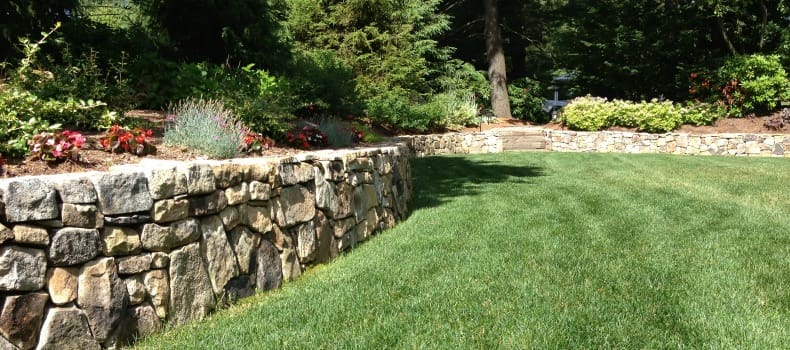
February
February may show glimpses of more sunshine, but temperatures in Bergen County are still low. It’s important to continue regular maintenance and address overgrown trees and shrubs. Although your lawn, trees and plants are growing at a much slower rate, you should avoid winter overgrowth.
Pest Control – Tall grass and overgrown trees and shrubs leave your landscape susceptible to a variety of outdoor insects and pests like field mice, gophers, burrowing animals, rats and snakes that want a warm place to sleep. Mice can destroy large parts of your lawn by building nests. They create dead spots where they spend all of their time, as well as pulling up large amounts of grass to build their nests. These types of outdoor pests can quickly destroy your lawn and landscape and create possible health concerns for small children and pets.
Foot Traffic – Avoid excessive foot traffic on your lawn, especially when it’s covered in snow. Although grass is naturally resilient, cold winter weather creates extra stress on grass roots. Cool-season grasses, commonly found in Northern NJ, usually turn brown and go dormant during the winter, then turn green again in the spring with proper care and fertilization. Excessive winter foot traffic on your lawn will weaken grass and make it harder for your lawn to recover when Spring rolls around.
March
March is a busy month for lawn care in NJ. Warm weather brings sunshine and Spring showers that create abundant new growth. Grass, plants, trees and shrubs all begin to grow much faster, so proper lawn care and maintenance is essential. In March, focus on jump-starting a healthy lawn.
Yard Cleanup – When the last signs of winter frost are gone, focus on cleaning up your yard to get rid of winter debris. Rake up dead, dry leaves and remove any fallen twigs, branches and trash that’s blown into your yard. Get rid of damp or wet leaves quickly, as they can smother new grass growth. Give your grass a good mowing weekly to prevent overgrowth.
Fertilization – March is a prime time to fertilize your lawn. After winter, grass and plants need essential nutrients like nitrogen, phosphorus, potassium and iron for strong roots and healthy new growth. Choose a light, slow-release or organic type fertilizer that won’t burn your lawn. Your landscape professional help you choose the best type of fertilizer.
Weed Control – Spring brings new growth, but it also brings lots of weeds. Aggressive weeds like crabgrass, thatch, dandelions and foxtails typically invade your lawn at the onset of warm weather. Crabgrass begins to germinate when soil temperatures reach 58 degrees Fahrenheit, and it can take over your entire lawn very quickly. By applying a pre-emergent herbicide in March, you can prevent aggressive weeds from invading your lawn.
Pest Control – Warm weather brings a variety of insects and outdoor pests to your lawn and landscape. They love to prey on fresh, new growth. In March, talk to a Bergen County landscape professional about proper pest control and an Integrated Pest Management Program (IPM) that focuses on organic lawn care in NJ.
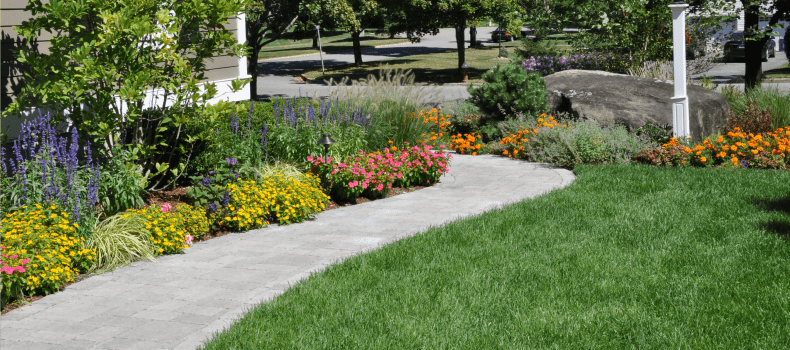
April
In April, when warm days clearly indicate that it’s Spring, continue regular weekly lawn care in NJ with lawn mowing and edging to prevent overgrowth and focus on new planting.
Planting – After frost is gone, it’s time to begin planting colorful flowers, border plants, new shrubs and special garden areas. When selecting plants, consider your existing soil type, light conditions, water requirements and planting locations that will impact growth and maintenance requirements. New Jersey is separated into four different planting zones – 6a, 6b, 7a and 7b. Bergen County is located in planting zones 6b and 7a. USDA hardiness planting zone information serves as a planting guide to give your landscape plants optimal year-round growth opportunities. If you’re unsure about plant selection and seasonal planting, talk to a professional landscape company that can help you choose the best plants for your existing landscape conditions.
Soil Testing – In April, when the soil has warmed up, do a soil test to find out the pH balance of your soil. The type of soil you have, acid or alkaline, will have a big impact on your lawn and plant growth and maintenance requirements. Sandy soils drain quickly and don’t hold moisture or nutrients well. Clay soils hold a lot of nutrients, but don’t let air or water penetrate. You can purchase a soil test kit at a local garden or home improvement store and do your own test, or call a landscape professional to do a soil test for you. If you hire a landscape company for regular lawn care in NJ, a soil test is usually included in regular lawn care and maintenance.
May
In May, as temperatures continue to climb, continue your regular lawn care and maintenance to keep your lawn and landscape well-maintained and free of weeds and overgrowth. In addition, you can continue with planting, pruning, mulching and weed control.
Planting – Finish planting your summer annuals, like marigolds, impatiens, petunias and salvia. When planting in beds or pots, make sure the roots are separated, so they can’t expand in the soil easily for growth. If roots are tangled or matted, separate them very gently.
Pruning – Prune plants when they have reached maximum foliage growth. Cut limbs or shoots back to live wood, so new growth can sprout. If there’s severe plant damage or the plant is dying, replace it. Prune Spring-flowering plants immediately after blooms fade, and Summer-flowering plants and trees before they start to bloom. In May, bare limbs will make it easier to examine plant structures and make proper cuts, and pruning mistakes will be hidden by with new summer growth.
Mulching – Mulch around planting beds, shrubs and trees before Summer heat arrives. Mulching is a simple, inexpensive way to add benefits to your lawn care in NJ. You can choose from organic or inorganic mulch compounds that provide benefits such as: moisture retention in the soil; even soil temperatures; protection from soil erosion; less soil compaction; less weed growth; and a finished look for your lawn and landscape.
Weed Control – Apply post emergence broadleaf herbicides to prevent summer weed growth. If needed, start post-emergence control of crabgrass, goose grass or nutsedge near the end of May.
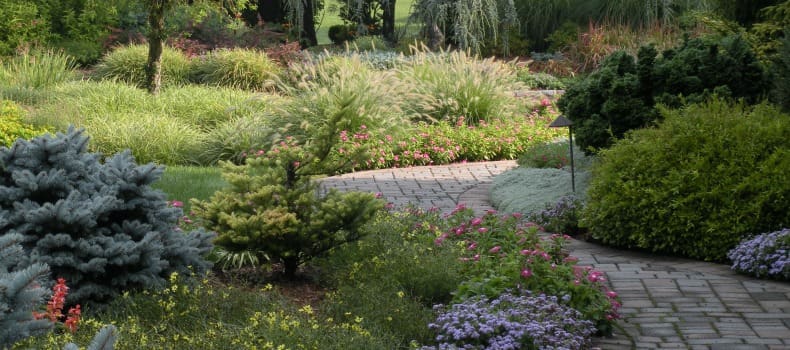
June
June is the beginning of Summer, and it brings hot sun, less rainfall and harmful insects to you lawn. In addition to regular lawn care and maintenance, you’ll need to keep your lawn properly irrigated and watch out for lawn diseases and insects.
Watering – Regular watering in hot weather is essential to keep soil and grass roots from drying out. It’s best to water infrequently, to a depth of about six inches, rather than watering all the time. Deep watering promotes stronger, deeper root systems that can reach farther underground for necessary water and nutrients. Quick, shallow watering isn’t adequate for Summer sun and heat when soil dries out a lot faster. Don’t over water! Over-watering contributes to fungal growth and lawn diseases. During Summer heat, water early in the morning or late in the afternoon for best lawn care in NJ.
Mowing – During the Summer, increase the mowing height on your lawn mower. Leaving your grass a little longer in the Summer will protect soil and grass roots from hot sun. Follow the mowing rule – only cut off the top one-third of grass blades. Leave grass clippings on the lawn for extra nutrients.
Pest Control – Keep a lookout for sod webworms that typically show up in June. Sod webworms, the larvae of lawn moths, live in the root level of your lawn and munch up the grass leaves. They can kill an entire lawn in a matter of days. When the weather turns hot, patches of your grass may start to turn brown. If you see little moths flying above your grass at dusk, and the brown patches start to get larger, you may have sod webworms.
July
Watering – Your lawn needs about 1 inch of water each week, either from sprinklers or rainfall. In July, continue watering enough to prevent turf wilting. Water two to three times each week, but avoid frequent daily irrigation.
Pest Control – During July, grub worms, the larvae of June and Japanese Beetles, begin to feed on healthy grass roots. They cause ugly brown patches in your lawn that can become extensive by Fall. Grub worm infestations cause your grass to look scorched with loose sod that lifts up easily. To be certain that the culprits are grubs, pull back the sod and look for white, C-shaped grubs. If you see more than 10 per square foot, your lawn should be treated with a pesticide. Grub worms, as well as caterpillars, aphids, chinch bugs, carpenter and red ants, fleas and ticks are commonly found in Northern NJ areas, and during hot weather they can flourish in your lawn causing extensive damage.
Pruning – If you have “bleeding trees,” those with a heavy sap flow, like maples, elms, dogwoods, birch or yellowwood trees in your landscape, it’s best to prune them in mid-summer.
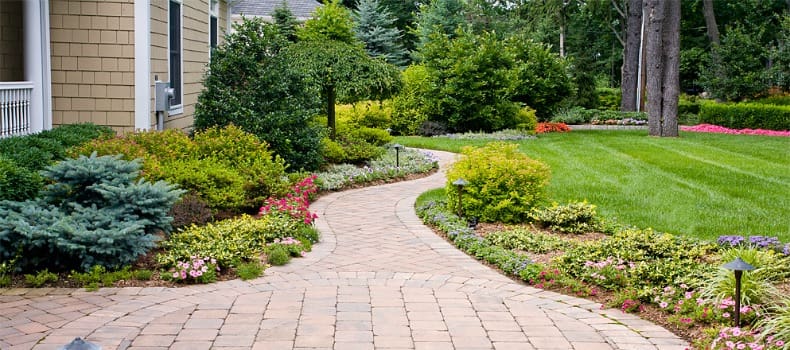
August
For the best lawn care in NJ, make plans for Fall lawn and garden renovations before cold weather arrives. August in Bergen County is usually still a warm month, so it’s important to continue regular lawn care and maintenance, Summer watering and pest control..
Planting – Over the Summer, your seasonal Spring and Summer flowers and plants will begin to wilt and die back. In August, remove dead growth and plants and replace them with Fall and Winter varieties.
September
During the fall, you need to prepare your lawn for winter. As cooler temperatures arrive, growth will start to decline and your grass, plants, shrubs and trees will begin to die back and go dormant.
Seeding and Sodding – If you plan to plant a new lawn, early Fall is the best time. Northern NJ temperatures are starting to cool down a little, and it’s important to seed or sod before cold weather sets in. Cool-season grasses like fine and tall Fescue, bluegrass, perennial ryegrass and wheat grass germinate best when soil temperatures are between 50 and 65 degrees Fahrenheit. These soil temperatures usually occur when daytime temperatures are between 60 and 75 degrees. When planted properly, Fescue grasses germinate within 10 to 14 days. For best results, seed or sod cool-season grasses when the temperature is below 70 degrees.
Fertilization – September is an important time to fertilize your lawn. Early Fall fertilization will help protect your lawn and plants during cold winter weather. It helps grass and plants to store essential nutrients in their root systems, so they have enough food for winter when nutrients get depleted. Cool-season grasses need a complete fertilizer as opposed to one that’s only high in nitrogen.
Lawn Aeration – Aerating your lawn, punching small holes in the soil, will reduce soil compaction in cold weather when the ground freezes. September lawn aeration will allow soil and grass roots to get and store needed oxygen, water and fertilizer through the winter months. For best aeration lawn care in NJ, it’s best to hire a landscape professional with aeration knowledge, skill and proper equipment.
October
In October, leaves start to turn bright autumn shades of yellow and orange, and they end up all over your lawn. Regular maintenance is especially important as leaves begin to fall.
Rake Up Leaves – If leaves are left on your lawn, they can deprive your grass of oxygen that’s essential for green, healthy growth. Excessive leaves can pack down and cause grass damage. Whether you choose to mow over them or rake them up, get them off the grass.
Fertilization – When a second application of Fall fertilizer is desired, mid-October is a good time. In October, cooler temperatures will discourage vigorous leaf growth, so an additional fertilizer application can prolong green grass color into the winter.
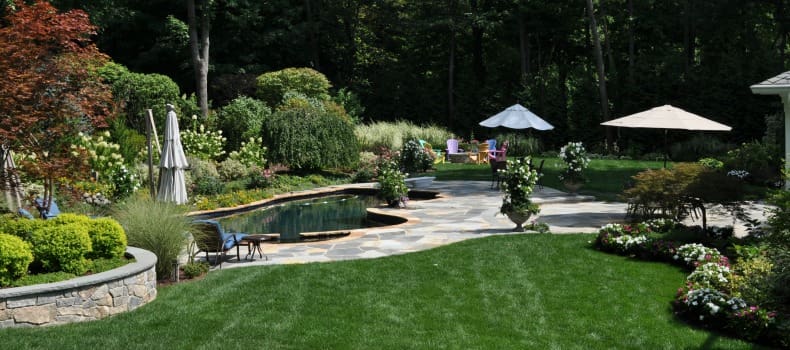
November
As winter approaches, continue regular lawn care in NJ to keep your lawn healthy and well-manicured.
Mowing – Continue mowing as long as your lawn is still growing to prevent overgrowth. Make sure your mower blades are sharp, and lower your mowing height as grass growth declines.
Watering – The weather may be getting cooler, but your lawn still needs one inch of water per week as long as it’s growing. If you seeded or planted new sod in early Fall, water until new grass growth is fully established.
December
December and January are the slowest months for lawn care in NJ, but regular maintenance is essential to keep overgrowth under control and prevent unwanted weeds, insects and pests. Continue regular lawn care and maintenance, and talk to your landscape professional about new, innovative Spring lawn ideas.

